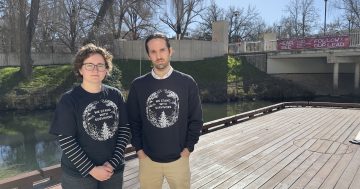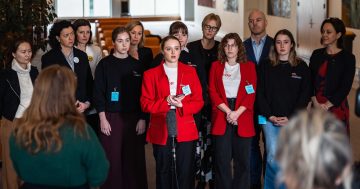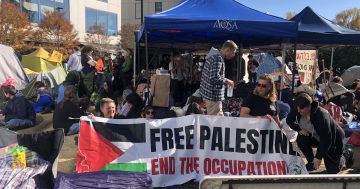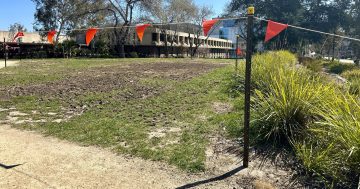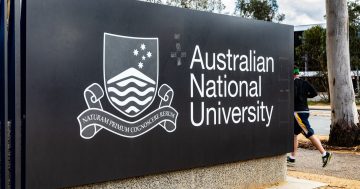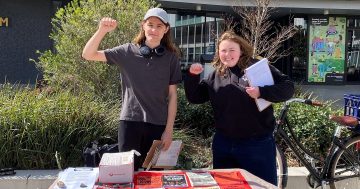
The struggles of ANU postgraduate students – particularly with English as a second language or dependents – has been highlighted in a student advocacy report calling for action. Photo: File.
A postgraduate Australian National University (ANU) body has issued a call for action to address the accommodation crisis facing some of our country’s “brightest minds”.
The Postgraduate and Research Students’ Association (PARSA) has sounded the alarm that students undertaking further studies might be driven away from enrolling at the ANU in Canberra.
It points to the lack of on-campus and affordable accommodation, lack of family-friendly accommodation, a failure to enact a promise for guaranteed first-year postgraduate accommodation and the pressures being faced due to the cost of living crisis as reasons why.
“Our report highlights the urgent need for action from the University, the government, and the wider community to address the housing affordability crisis,” PARSA president Tristan Yip said.
“Without intervention we risk losing our brightest minds to other universities and depriving many of the opportunity to study in one of the world’s finest tertiary institutions.”
PARSA has been examining the issue of housing access and affordability since 2018, but its Room for Change report focused specifically on postgraduate students.
PARSA equity officer Sharrada Segeran said 1719 respondents took part in the research survey and the results highlighted the sacrifices students were making to make ends meet.
“Parents and carers have had to choose less suitable and sometimes unsafe accommodation because that was their only option,” she said. “Students have had to take on additional jobs and reduce their study load to stay afloat when ideally their studies would have been the priority.”
If a postgraduate is able to secure on-campus accommodation, they usually reside at either Bruce Hall or Burgmann College. Currently it costs $500 per week and $516 per week, respectively, to stay at these colleges.
The report stated appropriate on-campus accommodation wasn’t provided for students with families, forcing them to look at the private market for rentals.
It highlighted studying parents, overseas students and students with disabilities were particularly vulnerable and at a disadvantage when compared to other students searching for accommodation.
“Securing affordable accommodation off-campus [for students with children] can result in substandard options that may not meet the safety needs of dependent children or be conducive to studying,” the report stated.
“International students are likely to face additional stress in the housing market, compared to domestic students, as they enter a country they are unfamiliar with, sometimes with English as their second language.
“Language barriers aside, these students do not have the local rental history landlords and agents require and cannot compete with local tenants.”
More than half of the report’s respondents were international students, with 24.5 per cent of the entire sample having English as a second language, while 10 per cent of respondents identified as students with dependents (either caring for children or a family member).
The report was critical of how long it would take the university to let overseas students know if they had secured on-campus accommodation, with some testimonials detailing how they only found out they had a room as they were boarding a plane to Australia.
It also pointed out that while enrolments of overseas students had increased, on-campus accommodation had not kept up with demand.
“The results paint a troubling picture of two-thirds of students arriving in Canberra without secure accommodation,” the report stated.
“While 40 per cent find secure accommodation within the first week, another 32 per cent are still looking up to two months later.”
The report has called for better communication from ANU to students regarding accommodation by establishing a cut-off date to inform students, ensuring continuity of emergency grants (as the university decides students’ PhD stipends), making on-campus accommodation more affordable and accessible, providing family-friendly on-campus accommodation and setting up a dedicated accommodation officer to increase support for students both on and off-campus.
In particular, PARSA wants the ANU to uphold its commitment to provide guaranteed one year of accommodation to first-year postgraduate students, which was meant to start in 2021.
“We call upon the Australian National University to implement the recommendations to ensure that our students’ wellbeing is prioritised and studies aren’t compromised,” Ms Segeran said.
“After all, postgraduate years are hard. We do not have to make them harder.”
An ANU spokesperson confirmed an updated 2024 student accommodation guarantee included a full-year offer for all undergraduate and postgraduate students starting in Semester 1.
“The residential experience team are dedicated to making living on campus as positive an experience as possible, and welcome feedback from the ANU community,” they said.
“ANU is committed to providing a high-quality student experience that includes safe and comfortable accommodation. The University is pleased the PARSA report indicates a very high satisfaction for students currently living in on-campus accommodation.”
They pointed out postgraduate accommodation was also available at Toad Hall, Graduate House, Ursula Hall (Laurus Wing) and Yukeembruk.
“The University is actively looking into creating additional family-friendly accommodation options,” the spokesperson said.












